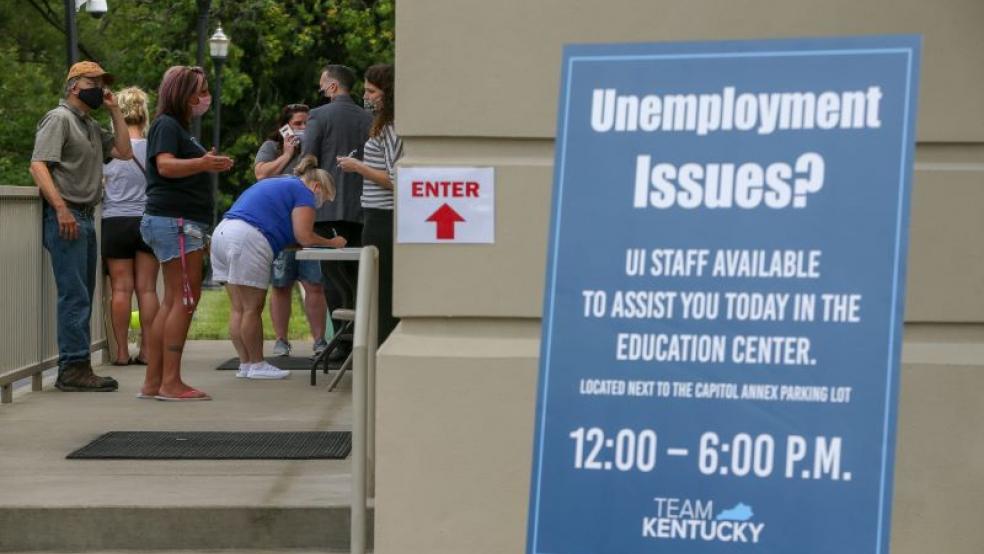The political war over unemployment benefits continued Tuesday as a group of 10 GOP senators led by Sen. Roger Marshall of Kansas introduced a bill that would phase out supplemental unemployment payments by the end of June. Under current law, the $300 per week payments, which are provided in addition to state benefits, are scheduled to last until September 6.
Republicans claim that the extra benefits are allowing Americans to remain unemployed longer than they would otherwise and blame the program for the disappointing April jobs numbers. Marshall told Forbes that Congress should “not be in the business of creating lucrative government dependency” that makes it “more beneficial to stay unemployed rather than return to work.”
The GOP bill, which would reduce the federal unemployment benefit to $150 a week at the end of May and eliminate it altogether a month later, is similar to plans announced by Republican governors in a number of states including Iowa, Montana, South Carolina and Tennessee to phase out the federal program within their states.
South Carolina Gov. Henry McMaster said Monday that the payments were damaging his state’s economy. “We’ve got help-wanted signs up everywhere, we get calls and letters, and texts from all sorts of businesses all across the state looking for people to work,” McMaster told Fox News’s Tucker Carlson. “People won’t come to work because they’re getting as much money or more in some cases by staying home.” McMaster also warned darkly that the program “is about as close to socialism that I’ve seen.”
A more complex story: While many Republican lawmakers and small business owners see the federal unemployment program as a serious problem that is weighing on the economic recovery, others aren’t so sure. Speaking at a conference Tuesday, Federal Reserve Governor Lael Brainard described some of the many factors that are holding back the economy, including fears of illness, a computer chip shortage, uneven school reopenings, a lack of day care options for parents and a hesitancy to get the vaccine in some parts of the population.
Brainard said that she doubted that the federal unemployment payments were a big part of the problem. “That story just doesn't make as much sense to me,” she said, noting that job growth was relatively robust in the leisure sector in April, and that continuing unemployment claims were falling. “People want to go back to work, they’re willing to do that,” Brainard said. “The big question for many is just whether those virus-related and in-person school related impediments are standing in the way.”
Notes from a beach town: The economy of Rehoboth Beach, Delaware, provides some lessons on the unusual course of the recovery so far. According to a report Tuesday by Jeanna Smialek and Jim Tankersley of The New York Times, the beach town is ready to reopen as vacation season heats up, but finding workers is a serious problem for the many bars and restaurants in town. However, the issue doesn’t seem to be the higher-than-usual level of unemployment benefits.
Instead, local business owners told Smialek and Tankersley that the pandemic seems to have fundamentally changed the nature of the labor pool. “There’s no labor out there,” one real estate developer told them. “It’s not even a question of, are you paying enough money?” Some people are afraid to return to work amid the pandemic, while others have changed industries or are searching for something new.
At some Wawa convenience stores in Delaware, workers are getting free hoagies as an enticement. At the Dogfish Head brewpub in Rehoboth Beach, new workers are being rewarded with cases of beer. But substantial increases in pay don’t seem to be a big part of the equation. While some restaurants have bumped base pay up from $9 an hour to $12, there is a reluctance to go too far with wage increases.
“Many managers are unwilling to raise wages and prices enough to keep up, as they worry that demand will ebb in a few months and leave them with permanently higher payroll costs,” Smialek and Tankersley write. “They are instead resorting to short-term fixes, like cutting hours, instituting sales quotas and offering signing bonuses to get people in the door.”
GOP bill unlikely to pass: No matter how the jobs situation plays out in the coming weeks, the Republican bill in the Senate is not expected to pass. Democratic Sen. Ron Wyden of Oregon, who backed the benefits, told Forbes he would oppose the GOP effort. “To take every penny from vulnerable people, many of them women, is just plain wrong,” Wyden said. “And I’m going to fight it every step of the way.”
Still, some Democrats seem open to the idea. Saying he has heard complaints from business owners, Sen. Tom Carper of Delaware said he would take a look at the Republican proposal. And Sen. Jon Tester of Montana said that he thinks the problem is regional in nature, and that he supports his state’s decision to end the payments early.




